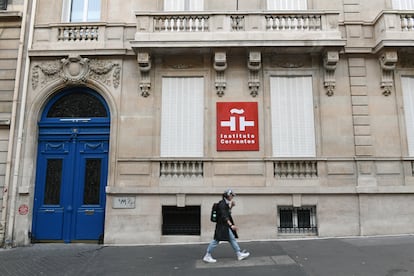Why Spain’s citizenship test contained a few nasty – and incorrect – surprises for aspiring applicants
‘Unfortunate errors’ in the preparation handbook for the 2022 exam included listing Mariano Rajoy as still being prime minister and stating that the death penalty is part of Spanish law
According to the handbook to prepare for the official examination to become a citizen of Spain, Mariano Rajoy is still the prime minister (he hasn’t been since June 2018), the death penalty still exists (it was banned in 1978 and completely abolished, including for wartime conditions, in 1995) and the Spanish Constitution is just a secondary law.
The Cervantes Institute, the public cultural institution that drafts and administers the citizenship exam, said it has corrected the mistakes detected in the manual to prepare for the test that checks applicants’ knowledge about Spanish culture, society, history and laws, known as CCSE.
Obtaining citizenship typically requires passing the CCSE and also taking a language test, the DELE A2, unless a high level of Spanish can be proven.
According to the Cervantes Institute, a “computer glitch” is to blame for the erroneous information contained in the handbook to prepare for the 2022 CCSE test. The manual was published on November 29.

The CCSE test, which costs €85, asks applicants 25 questions that must be answered within a 45-minute time frame. In order to pass, it is necessary to get at least 15 questions right. Topics include government and political organization, fundamental rights and obligations of Spaniards and different aspects of Spanish society. Errors were detected in 12 of the 300 questions included in the preparation manual, or 5% of the total.
The multiple-choice questions on the CCSE test give applicants a choice of three answers (A, B and C). The errors were allegedly caused by the fact that the computer program preserved the same letters to represent the correct answers on new test questions that had been changed from the previous test.
The Cervantes Institute has called the incident “an unfortunate mistake” and admitted that it is potentially serious because tests get automatically corrected, meaning that the system could give a failing grade to applicants who check the right answer.
A group called Legalteam that provides legal advice on citizenship issues noticed the mistakes and alerted the public agency, where officials said the errors had already come to their attention through various channels. These sources said that experts have checked the handbook’s answers “one by one” and fixed all the mistakes.
But clearly this work was not carried out before publishing the manual in late November, as anyone with a working knowledge of Spanish society would have known that primary education is free and that driver’s licenses are issued by the traffic authority, the Dirección General de Tráfico (DGT), despite what the preparation manual said. Sources consulted by this newspaper did not specify whether the mistakes were attributable to the cultural institution’s own computer services or to a contractor.
Legalteam has also flagged up the fact that the Cervantes Institute requires applicants to show their TIE card (Tarjeta de Identidad de Extranjeros or Foreign Citizen Identity Card), and accepts no other legal documents in its place. The legal advisors noted that when foreign citizens renew their residency papers, the protection this affords “has full legal effects before any government administration.” Sources at the Cervantes replied that it is up to the justice and interior ministries to determine what documentation is necessary to avoid cases of fraud in citizenship examinations.
Tu suscripción se está usando en otro dispositivo
¿Quieres añadir otro usuario a tu suscripción?
Si continúas leyendo en este dispositivo, no se podrá leer en el otro.
FlechaTu suscripción se está usando en otro dispositivo y solo puedes acceder a EL PAÍS desde un dispositivo a la vez.
Si quieres compartir tu cuenta, cambia tu suscripción a la modalidad Premium, así podrás añadir otro usuario. Cada uno accederá con su propia cuenta de email, lo que os permitirá personalizar vuestra experiencia en EL PAÍS.
¿Tienes una suscripción de empresa? Accede aquí para contratar más cuentas.
En el caso de no saber quién está usando tu cuenta, te recomendamos cambiar tu contraseña aquí.
Si decides continuar compartiendo tu cuenta, este mensaje se mostrará en tu dispositivo y en el de la otra persona que está usando tu cuenta de forma indefinida, afectando a tu experiencia de lectura. Puedes consultar aquí los términos y condiciones de la suscripción digital.

